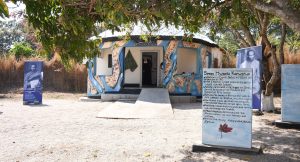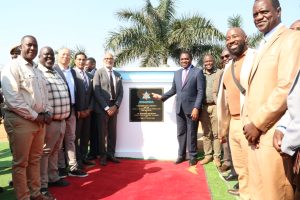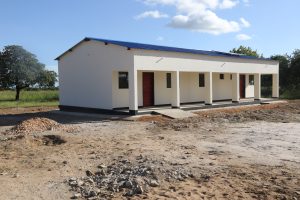It is said Mazabuka is the sweetest town in Zambia due to the Sugar cane industry being predominantly located in the district.
Its contribution to the country’s Gross Domestic Product (gdp) is at 4 per cent and accounts for about 6 per cent of national exports.
But to Mazabuka District, Sugar Cane is the lifeblood of socio-economic activity as it creates thousands of direct and indirect jobs hovering around 10,000, as well as spurs and turns the wheels of the local economy due to its impact on other sectors that depend on the sugarcane industry.
Since Sugar cane growing commenced in Mazabuka over 60 years ago, it is deemed a lucrative business just like any other agriculture business, but the question that has attracted debate in Mazabuka is whether cane levy of 30 Ngwee per tonne is economically sound or not.
For a town like Mazabuka whose main economic activities revolve around sugar cane growing, many cane growers are up in arms against maneuvers by the local authority to increase the levy to K100.
The growing and processing of cane into its final product, sugar has earned Mazabuka its name as a sweet town.
The district is indeed sweet, 75 per cent of the land is covered by sugar cane plantations.
The humane affection to the sugar cane plantation is undeniably strong; streets and open market places all relate to the fine, tasty and juicy canes.
Small scale farmers and out-grower schemes supply their cane to Zambia Sugar Company who own the largest plantation in the SADC region.
Since the 1960s when cane growing began in Mazabuka, cane growers have been obliged to pay to the local authority a cane levy as a means of a charge for trading within the municipality and contributing to revenue to the council.
With the decentralization policy in effect, councils are expected to maximize on revenue collection to meet the increasing demand for quality service delivery.
In 1986, the Mazabuka council reviewed the cane levy to 30 Ngwee per tonne for cane growers, which resonated with the economic value then.
However, 38 years later, the cost of cane levy per tonne has remained at 30 Ngwee per tonne while the economic value has arguably somersaulted numerous times.
But a debate on whether the cane levy should be maintained at 30 Ngwee per tonne or increased to K100 per tonne has erupted at Mazabuka local authority.
The council in its last sitting proposed to increase the cane levy, and argued that the current levy is not economically sound if they have to broaden their revenue collection basket and be able to deliver services.
Through the lens of an economic eye, 30 Ngwee per tonne falls short of the cheapest service on the market. For instance a stem of sugar cane on average is sold at K10 on the market.
Despite this reality, cane growers in the district have resisted the proposed increment of the cane levy citing climate change and drought crisis as their basis for not agreeing with the council plan.
The association of cane growers of Mazabuka District Chairperson Clint Bruyns has further challenged the council to halt the proposal and give its members time to recover from the drought crisis.
“The time to push for the adjustment is wrong. The members are not producing enough canes because of the drought and climate change and business is slow,” Mr Bruyns lamented.
He stated that members feel it is not right for the council to push for an increase but instead wait until when business returns to normalcy.
The Zambia Sugar Company, who is the main buyer of the cane from small scale growers and stakeholders in the business have through the Corporate affairs manager Eugene Chungu stated that the local authority should consider finding other means of maximizing revenue than relying on cane growers.
Mr Chungu stated that cane growers are undertaking a lot of social responsibilities in the community and therefore, increasing revenue by over 300 percent will strain the effort of social responsibility.
“We are helping out in the community with social responsibilities, and the current proposal is unfair, unless if we agree to reduce CSR, then the community will surfer at the expense of the local authority’s demand,” said Mr Chungu.
A stakeholders engagement with cane commercial farmers , that included Clinton Cowly from Syringa Cane Farms , Clint Bruyns and Anthea Cox who is the secretary of the district cane growers association rejected the proposed increase by the local authority.
The commercial farmers argued that they have been playing a vital role in ensuring local people benefit from employment in cane and sugar plantations, and farmers remain the main revenue contributors to Mazabuka local authority
“As the current situation stands, the impact of climate change on farmers has negatively affected the business, and production has reduced,” Clinton Cowly complained.
“The proposal is a good one but has come at the wrong time, we wish they could consider it for the future, cause as things stand now, we can’t talk about an increment under the current economic status,” said Anthea Cox.
Mazabuka town clerk Judith Mukwita, however maintained that the local authority relies on revenue from stakeholders such as cane farmers as the main source of revenue for quality service delivery.
“The local authority is also feeling the impact of climate change the same way cane farmers are feeling it or even worse and will not bow to calls of climate change as every other institution is feeling the impact,” said Ms Mukwita.
The town clerk said the council has a target to ensure the district attains a city status in the near future and it has been criticized by stakeholders for failing to meet the benchmark standard of community service demands due to low revenue collections from its stakeholders.
“Of course you are doing your best in servicing the communities around your working areas, but a common person out there is not previledged to access those services, for example, roads are done on the estates but roads are bad in the compounds and people are pointing at the local authority. We can’t be failing to do our duties simply because we are collecting 30 Ngwee, that’s being unfair to the community which surrendered thousands of hectares of land for cane growing to farmers who pay less to the local authority,” explained Ms Mukwita.
Mazabuka Mayor Vincent Lilanda could not hide the desire of the district being conferred with a city status in the soonest possible time , which is dependent on enhanced quality service delivery.
Mr Lilanda further compared small industries that are contributing more than what well established cane growers are contributing to the local authority treasury
“No industry is sacred and let’s be equal and move along with the economic value,” said Mr Lilanda.
“As politicians, we are criticized of failing to deliver according to our campaign promises but the resistance is from our stakeholders, I urge you to reason with the local authority and do the right thing for the betterment of the district,” Mr Lilanda remarked as he wiped sweat from his face, during the heated meeting.
Mazabuka District Chamber of Commerce president Mukela Muyunda is against the proposed increase of cane levy and stated that the local authority is imposing an unfair levy on local cane farmers.
” The proposed K100 is too much and the hardships farmers are going through cannot sustain the increment to K100. Let’s be realistic, almost all businesses are affected by climate change, loadshedding and you talk about an increase, that’s not fair,” Mr Muyunda lamented.
Reaching consensus on the matter seems far more than expected though the local authority has pressure on it’s shoulders to enhance service delivering, while the stakeholders have businesses to sustain. On the other hand, the minister of local government and rural development who is also Mazabuka Central member of parliament Gary Nkombo has on several occasions implored councils to be innovative and generate local revenue to raise the standard of service delivery to the people, and ultimately transformation of their local authorities and communities.





